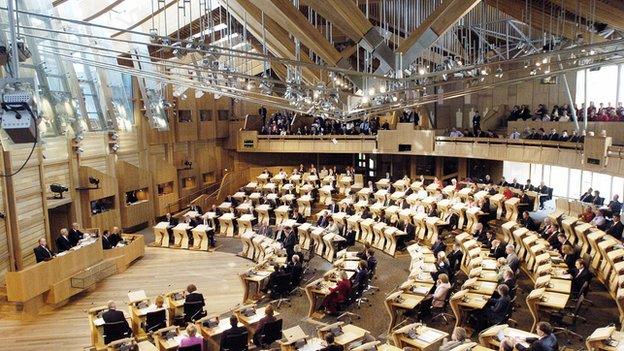Scottish independence: Alex Salmond outlines childcare 'savings'
- Published
Childcare plans in the independence White Paper would see families save up to £4,600 per child each year, First Minister Alex Salmond has told MSPs.
During a debate on the newly published independence blueprint, he insisted the move would be "transformational".
But the leader of the Scottish Labour Party, Johann Lamont, challenged Mr Salmond to meet her so they could find the money now to deliver the policy.
MSPs are being given the chance to debate the 670-page White Paper, external.
Ms Lamont accused the first minister of only just recognising the matter of childcare, while she had known it to be an issue "all of my working life".
She added: "He [Alex Salmond] should put his money where his mouth is and make a difference right now."
The first minister hit back, saying he had discussed the issue with Ms Lamont previously and she had offered no new plan of action.
A referendum on Scottish independence will be held on 18 September next year, with voters being asked the straight yes/no question: "Should Scotland be an independent country?"
The White Paper, which contains the arguments in favour of independence and is intended as a guide to what might happen if it is achieved, was launched by Mr Salmond at Glasgow's Science Centre on Tuesday morning.
Proposals included extending the support available to young people and their families and to expand childcare provision to match the best in Europe.
Under its plans, it said children would be entitled to 30 hours of childcare each week - the same number of hours as a child at primary school - benefiting about 240,000 children.
During a heated debate in Holyrood's main chamber, Mr Salmond said he was looking to bring more than 100,000 women into the workforce.
He said the childcare plan would cost £700m, money that could be found through an independent Scotland choosing not to fund nuclear weapons - what he called a choice between "weapons of mass destruction and educating our children".
He added that a 6% increase in participation would raise £700m in extra tax revenue.
However, Ms Lamont said the money would be required "upfront".
She said: "If it was 'transformational', if [Mr Salmond] believed it was that important, he would start now."
She said she had previously offered to work with Mr Salmond on a new childcare commission, adding: "I'll offer him that now. I'll work with him on his budget to make sure that childcare is properly funded."
In reply, Mr Salmond said a "childcare revolution is impossible under devolution" and challenged Ms Lamont to say what public services she would cut to fund the plan.
The White Paper confirmed that Scotland would seek to secure a Sterling currency union with the remainder of the UK after independence, and asserted that the country would negotiate for a smooth transition to EU and Nato membership.
The leader of the Scottish Conservatives, Ruth Davidson, said the SNP was "grasping at straws" over EU membership, adding that the average joining time for new EU states was eight years.
She said: "The Scottish government is desperate to prove that they don't have to come out of Europe before they get to go back in. They are contorting themselves. But the weight of evidence just doesn't add up."
Meanwhile, responding to the White Paper, Scottish Liberal Democrat leader Willie Rennie called Mr Salmond "the patron saint of blind optimism".
The document makes a series of pledges to be fulfilled if the SNP forms the first government in a newly-independent Scotland.
These included:
Thirty hours of childcare per week in term time for all three and four-year-olds, as well as vulnerable two-year-olds.
Trident nuclear weapons, currently based on the Clyde, removed within the first parliament.
Housing benefit reforms, described by critics as the "bedroom tax", to be abolished, and a halt to the rollout of Universal Credit.
It would be in Scotland's interest to keep the pound, while the Bank of England would continue as "lender of last resort".
BBC Scotland replaced at the start of 2017 with a new Scottish broadcasting service, continuing a formal relationship with the rest of the BBC.
Basic rate tax allowances and tax credits to rise at least in line with inflation.
A safe, "triple-locked" pension system.
Minimum wage to "rise alongside the cost of living".
- Published27 November 2013
